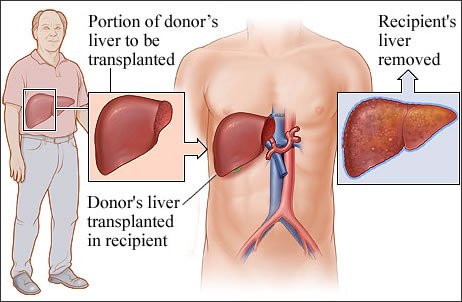
effect on body part
- Liver
- Kidneys
- Gastrointestinal Tract
- Central Nervous System
What is Liver Transplant Counselling ?
Liver transplant counselling is a crucial process that provides patients and their families with essential information and support before, during, and after a liver transplant. This counselling involves discussions about the transplant procedure, risks and benefits, and the lifestyle changes required to ensure successful outcomes. It also addresses the emotional and psychological aspects of the transplant, including coping with the diagnosis, the waiting period, and the transition to life after surgery.
Liver transplant counselling is typically conducted by a multidisciplinary team of healthcare professionals, including surgeons, hepatologists, nurses, and social workers. The team works together to provide patients with a comprehensive understanding of the transplant process and to address their individual needs and concerns. Counselling sessions cover various topics, such as the different types of liver transplants, the eligibility criteria, the evaluation process, and the surgical techniques involved. Additionally, counsellors discuss the potential risks and complications of the transplant, including the risk of rejection, infection, and bleeding. They also emphasize the importance of adherence to medication regimens and lifestyle modifications, such as a healthy diet and regular exercise, to promote long-term graft survival and overall well-being.

effect on body part
- Liver
- Kidneys
- Gastrointestinal Tract
- Central Nervous System
What is Liver Transplant Counselling ?
Liver transplant counselling is a crucial process that provides patients and their families with essential information and support before, during, and after a liver transplant. This counselling involves discussions about the transplant procedure, risks and benefits, and the lifestyle changes required to ensure successful outcomes. It also addresses the emotional and psychological aspects of the transplant, including coping with the diagnosis, the waiting period, and the transition to life after surgery.
Liver transplant counselling is typically conducted by a multidisciplinary team of healthcare professionals, including surgeons, hepatologists, nurses, and social workers. The team works together to provide patients with a comprehensive understanding of the transplant process and to address their individual needs and concerns. Counselling sessions cover various topics, such as the different types of liver transplants, the eligibility criteria, the evaluation process, and the surgical techniques involved. Additionally, counsellors discuss the potential risks and complications of the transplant, including the risk of rejection, infection, and bleeding. They also emphasize the importance of adherence to medication regimens and lifestyle modifications, such as a healthy diet and regular exercise, to promote long-term graft survival and overall well-being.
Types Of Liver Transplant Counselling
Pre-Transplant Counselling
Informs patients about the transplant process, risks, and benefits.
Assesses medical and psychological eligibility for transplantation.
Provides education on lifestyle changes and medication adherence.
Intra-Transplant Counselling
Supports patients during the transplant surgery and hospital stay.
Addresses fears, anxiety, and pain management.
Provides emotional and practical assistance for family members.
Post-Transplant Counselling
Monitors patients’ recovery and adherence to treatment plans.
Addresses challenges related to immunosuppression, organ rejection, and lifestyle adjustments.
Provides ongoing emotional support and coping mechanisms.
Grief and Loss Counselling
Assists patients and families who have experienced the loss of a donor or transplant recipient.
Facilitates the grieving process and provides coping strategies.
Offers support and resources for emotional well-being.
Ethical Counselling
Discusses ethical dilemmas associated with organ donation and transplantation.
Involves patients, families, and healthcare professionals in decision-making.
Addresses issues of consent, allocation, and equitable access.
Lifestyle Modification Counselling
Promotes healthy lifestyle choices to support liver function and overall well-being.
Includes guidance on diet, exercise, stress management, and smoking cessation.
Connects patients with support groups and resources.
Types Of Liver Transplant Counselling
Pre-Transplant Counselling
Informs patients about the transplant process, risks, and benefits.
Assesses medical and psychological eligibility for transplantation.
Provides education on lifestyle changes and medication adherence.
Intra-Transplant Counselling
Supports patients during the transplant surgery and hospital stay.
Addresses fears, anxiety, and pain management.
Provides emotional and practical assistance for family members.
Post-Transplant Counselling
Monitors patients’ recovery and adherence to treatment plans.
Addresses challenges related to immunosuppression, organ rejection, and lifestyle adjustments.
Provides ongoing emotional support and coping mechanisms.
Grief and Loss Counselling
Assists patients and families who have experienced the loss of a donor or transplant recipient.
Facilitates the grieving process and provides coping strategies.
Offers support and resources for emotional well-being.
Ethical Counselling
Discusses ethical dilemmas associated with organ donation and transplantation.
Involves patients, families, and healthcare professionals in decision-making.
Addresses issues of consent, allocation, and equitable access.
Lifestyle Modification Counselling
Promotes healthy lifestyle choices to support liver function and overall well-being.
Includes guidance on diet, exercise, stress management, and smoking cessation.
Connects patients with support groups and resources.
Your trusted destination for comprehensive care and management of gastroenterology diseases
Your trusted destination for comprehensive care and management of gastroenterology diseases
Treatment Approaches at Gastroworld Clinic
Pre-Operative Evaluation
Comprehensive medical history and physical examination Liver function tests, imaging studies, and other diagnostic tests Assessment of overall health and suitability for transplant.
Patient Education and Support
Gastroworld Clinic providing detailed information about the transplant process, risks, and expectations. Facilitating support groups and connecting patients with resources.
Psychosocial Counseling
Gastroworld Clinic addressing the emotional, social, and psychological aspects of undergoing a liver transplant. Helping patients cope with anxiety, depression, and other challenges.
Nutritional Counseling
Gastroworld Clinic optimizing the patient's nutritional status before and after transplant to ensure optimal recovery and maintain liver health.
Medication Management
Gastroworld Clinic Doctors Team monitoring and adjusting medications to prevent rejection, manage complications, and support liver function.
Post-transplant Follow-up and Care
Providing ongoing medical care, monitoring, and support after the transplant to ensure long-term success and prevent complications.
Treatment Approaches at Gastroworld Clinic
Pre-Operative Evaluation
Comprehensive medical history and physical examination Liver function tests, imaging studies, and other diagnostic tests Assessment of overall health and suitability for transplant.
Patient Education and Support
Gastroworld Clinic providing detailed information about the transplant process, risks, and expectations. Facilitating support groups and connecting patients with resources.
Psychosocial Counseling
Gastroworld Clinic addressing the emotional, social, and psychological aspects of undergoing a liver transplant. Helping patients cope with anxiety, depression, and other challenges.
Nutritional Counseling
Gastroworld Clinic optimizing the patient's nutritional status before and after transplant to ensure optimal recovery and maintain liver health.
Medication Management
Gastroworld Clinic Doctors Team monitoring and adjusting medications to prevent rejection, manage complications, and support liver function.
Post-transplant Follow-up and Care
Providing ongoing medical care, monitoring, and support after the transplant to ensure long-term success and prevent complications.
Frequently Asked Questions
What is liver transplant counselling, and why is it important?
Liver transplant counselling is a comprehensive process that involves providing education, support, and guidance to patients and their families throughout the liver transplant journey. It aims to address emotional, psychological, and practical aspects of transplantation, helping patients make informed decisions, cope with challenges, and achieve the best possible outcomes.
Who provides liver transplant counselling?
Liver transplant counselling is typically provided by a multidisciplinary team of healthcare professionals, including transplant coordinators, social workers, psychologists, dietitians, and other specialists. These professionals work together to address the diverse needs of patients and their families before, during, and after transplantation.
What topics are covered during liver transplant counselling sessions?
Liver transplant counselling covers a wide range of topics, including the transplant evaluation process, waitlist management, surgical considerations, post-transplant care, medication management, psychological support, nutritional guidance, and coping strategies for patients and their families.
How can I prepare for liver transplant counselling?
To prepare for liver transplant counselling, patients and their families should gather relevant medical records, prepare a list of questions or concerns, familiarize themselves with the transplant process, and be open and honest about their emotions, preferences, and goals. It’s also helpful to bring a support person to appointments for added comfort and assistance.
What can I expect during liver transplant counselling sessions?
During liver transplant counselling sessions, patients can expect to receive personalized education, support, and guidance tailored to their specific needs and circumstances. Counsellors will address any questions or concerns, provide information about the transplant process, and help patients and their families navigate the emotional and practical challenges associated with transplantation.
